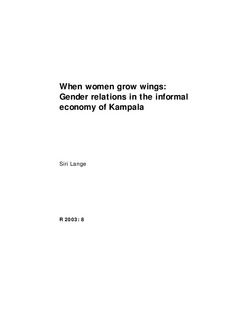When women grow wings: Gender relations in the informal economy of Kampala
Research report
Permanent lenke
http://hdl.handle.net/11250/2436067Utgivelsesdato
2003Metadata
Vis full innførselSamlinger
- Bora-import [434]
Sammendrag
In urban Africa, informal employment constitutes 90 per centof all new jobs. Informal work is characterised by beingunrecognised, unprotected or unrecorded by the publicauthorities, and a larger percentage of women than men earntheir living in the informal economy.This study looks into the gender relations of theinformal economy of Kampala. A combination of internal warand unrest, economic crisis, the AIDS epidemic, economicrestructuring, and government policies enhancing women, havechanged gender relations in Uganda over the last decades.Urban men were once expected to provide for their families,but today married women bring in 50-70 per cent of householdincomes.While some men feel threatened by women’seconomic independence, others realise that femaleentrepreneurship is needed in the present economic realities.Many women complain that since they started working, themen have stopped contributing to household expenses.The bulk of women are engaged in sectorstraditionally defined as female, but some venture into malearenas where profits are generally higher. Similarly, men withlimited capital have started going into ‘female’ domains (suchas catering and hair styling), changing the landscape of theurban informal economy.Informants interviewed for this study cited lack ofcapital as a major obstacle. Almost one in two started theirenterprise with less than US$ 55, and more than one third claimto make less than US$ 57 a month. Some female respondentshad benefited from micro finance loans, but the majority weredeeply sceptical of micro finance institutions.While increased formalisation would enhance both thenational economy as a whole and enhance worker’s security, anunfair and random tax system functions as an incentive for theself-employed to stay informal and avoid expansion.
Utgiver
Chr. Michelsen InstituteSerie
Research reportR 2003: 8
